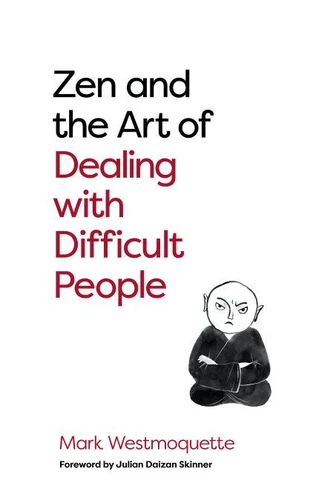Zen and the Art of Dealing with Difficult People
Par : ,Formats :
Disponible dans votre compte client Decitre ou Furet du Nord dès validation de votre commande. Le format ePub protégé est :
- Compatible avec une lecture sur My Vivlio (smartphone, tablette, ordinateur)
- Compatible avec une lecture sur liseuses Vivlio
- Pour les liseuses autres que Vivlio, vous devez utiliser le logiciel Adobe Digital Edition. Non compatible avec la lecture sur les liseuses Kindle, Remarkable et Sony
- Non compatible avec un achat hors France métropolitaine
 , qui est-ce ?
, qui est-ce ?Notre partenaire de plateforme de lecture numérique où vous retrouverez l'ensemble de vos ebooks gratuitement
Pour en savoir plus sur nos ebooks, consultez notre aide en ligne ici
- Nombre de pages224
- FormatePub
- ISBN978-1-78678-610-4
- EAN9781786786104
- Date de parution14/12/2021
- Protection num.Adobe DRM
- Taille793 Ko
- Infos supplémentairesepub
- ÉditeurWatkins Publishing
Résumé
Discover how you can use Zen Buddhist practices and mindfulness tools to cope with the difficult people-or 'troublesome Buddhas'-in your life. Perhaps you can see there's a pattern to your behavior in relation to the challenging people in your life-and that it often causes pain. Here, Zen monk Mark Westmoquette argues how the only way we can grow is by facing this pain, acknowledging how we feel and how we've reacted, and making an intention or commitment to end this repeating pattern of suffering.
Often times these difficult people-or "troublesome Buddhas"-can prove useful teachers. Westmoquette speaks from a place of profound personal experience. He endured two life-changing traumas caused by other people: his sexual abuse by his own father; and his stepfather's death and mother's serious injury in a car crash due to the careless driving of an off-duty policeman. He stresses that by bringing awareness and kindness to these relationships, our initial stance of "I can't stand this person, they need to change" will naturally shift into something much broader and more inclusive.
The book makes playful use of Zen koan-apparently nonsensical phrases or stories-to help jar us out of habitual ways of perceiving the world and nudge us toward a new perspective of wisdom and compassion.
Often times these difficult people-or "troublesome Buddhas"-can prove useful teachers. Westmoquette speaks from a place of profound personal experience. He endured two life-changing traumas caused by other people: his sexual abuse by his own father; and his stepfather's death and mother's serious injury in a car crash due to the careless driving of an off-duty policeman. He stresses that by bringing awareness and kindness to these relationships, our initial stance of "I can't stand this person, they need to change" will naturally shift into something much broader and more inclusive.
The book makes playful use of Zen koan-apparently nonsensical phrases or stories-to help jar us out of habitual ways of perceiving the world and nudge us toward a new perspective of wisdom and compassion.
Discover how you can use Zen Buddhist practices and mindfulness tools to cope with the difficult people-or 'troublesome Buddhas'-in your life. Perhaps you can see there's a pattern to your behavior in relation to the challenging people in your life-and that it often causes pain. Here, Zen monk Mark Westmoquette argues how the only way we can grow is by facing this pain, acknowledging how we feel and how we've reacted, and making an intention or commitment to end this repeating pattern of suffering.
Often times these difficult people-or "troublesome Buddhas"-can prove useful teachers. Westmoquette speaks from a place of profound personal experience. He endured two life-changing traumas caused by other people: his sexual abuse by his own father; and his stepfather's death and mother's serious injury in a car crash due to the careless driving of an off-duty policeman. He stresses that by bringing awareness and kindness to these relationships, our initial stance of "I can't stand this person, they need to change" will naturally shift into something much broader and more inclusive.
The book makes playful use of Zen koan-apparently nonsensical phrases or stories-to help jar us out of habitual ways of perceiving the world and nudge us toward a new perspective of wisdom and compassion.
Often times these difficult people-or "troublesome Buddhas"-can prove useful teachers. Westmoquette speaks from a place of profound personal experience. He endured two life-changing traumas caused by other people: his sexual abuse by his own father; and his stepfather's death and mother's serious injury in a car crash due to the careless driving of an off-duty policeman. He stresses that by bringing awareness and kindness to these relationships, our initial stance of "I can't stand this person, they need to change" will naturally shift into something much broader and more inclusive.
The book makes playful use of Zen koan-apparently nonsensical phrases or stories-to help jar us out of habitual ways of perceiving the world and nudge us toward a new perspective of wisdom and compassion.




